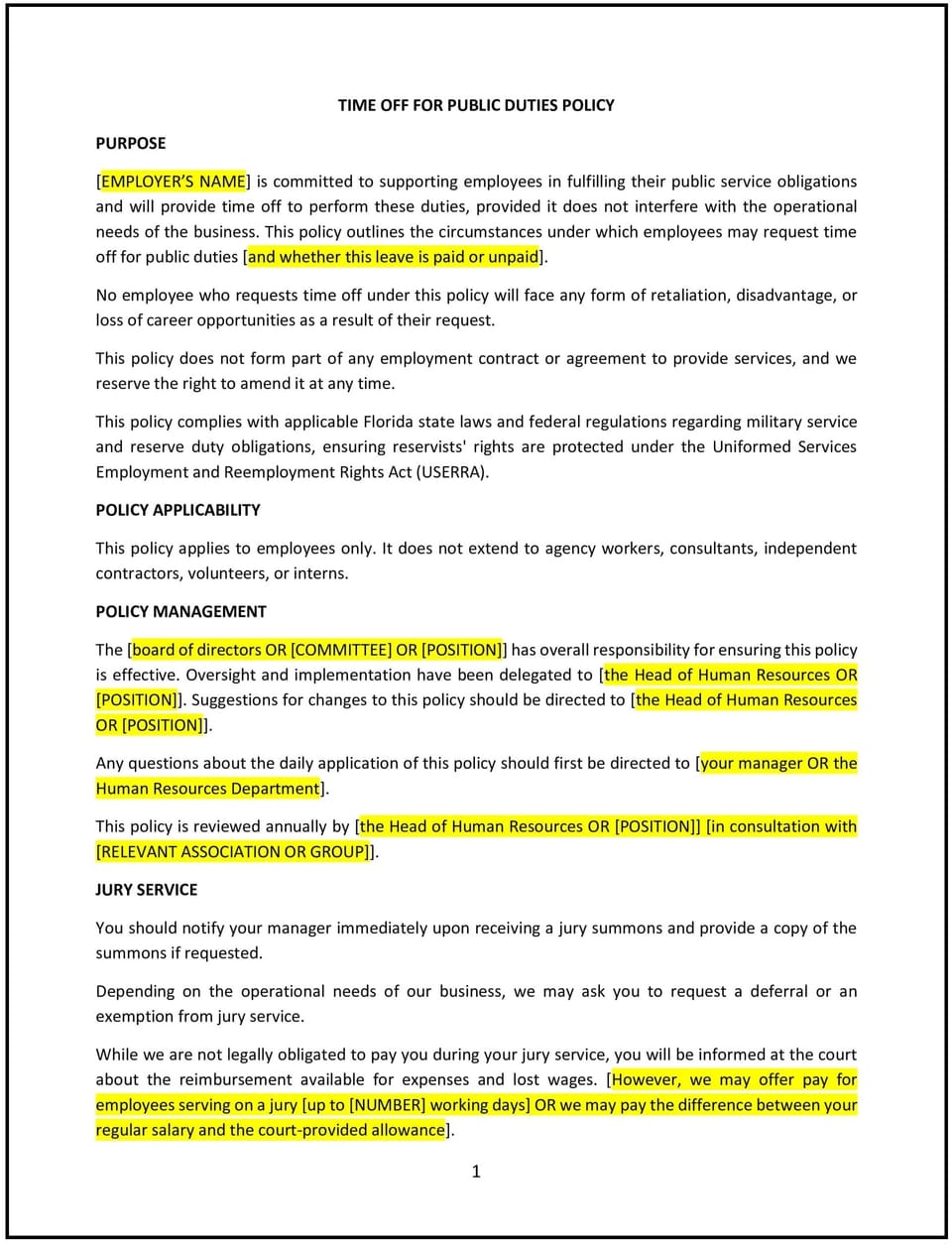Time off for public duties policy (Florida): Free template

Time off for public duties policy (Florida)
A time off for public duties policy helps Florida businesses create a framework for supporting employees who engage in civic responsibilities. This policy outlines procedures for granting leave for activities such as jury duty, voting, or serving as an election official. It is designed to promote civic engagement, reduce conflicts, and provide clear guidelines for handling requests for time off related to public duties.
By implementing this policy, businesses in Florida can demonstrate their commitment to community involvement, foster goodwill among employees, and align with the state’s values of civic participation.
How to use this time off for public duties policy (Florida)
- Define eligible public duties: Clearly specify which activities qualify for time off, such as jury duty, voting, or serving as an election official.
- Establish request procedures: Outline how employees should request time off, including whom to contact and how to document requests.
- Specify leave terms: Explain whether the leave is paid or unpaid and any conditions that apply, such as proof of service or duration limits.
- Communicate expectations: Clarify the business’s expectations regarding scheduling, work coverage, and returning to work after fulfilling public duties.
- Address potential conflicts: Provide guidance on resolving scheduling conflicts or operational challenges caused by employee absences.
- Communicate the policy: Share the policy with employees during onboarding and through internal communications to ensure awareness and understanding.
- Monitor adherence: Regularly review how the policy is applied and address any concerns or discrepancies promptly.
- Update the policy: Periodically assess the policy to reflect changes in state laws, workplace dynamics, or business needs.
Benefits of using this time off for public duties policy (Florida)
This policy offers several advantages for Florida businesses:
- Promotes civic engagement: Supporting employees in fulfilling public duties encourages active participation in democracy.
- Reduces conflicts: Clear guidelines help minimize misunderstandings or disputes about time-off requests.
- Builds goodwill: A policy that supports civic responsibilities fosters loyalty and trust among employees.
- Aligns with community values: Reflects Florida’s emphasis on civic responsibility and community involvement.
- Enhances workplace culture: A policy that prioritizes civic duties fosters trust, respect, and a positive work environment.
- Improves preparedness: Defined procedures make it easier to manage absences and maintain operational efficiency.
- Supports legal alignment: Helps businesses stay informed about state-specific requirements for time off related to public duties.
Tips for using this time off for public duties policy (Florida)
- Communicate clearly: Ensure employees understand the policy by providing written materials and discussing it during meetings or training sessions.
- Train managers: Educate supervisors on how to handle time-off requests related to public duties fairly and consistently.
- Be flexible: Consider offering additional accommodations, such as flexible hours, to support employees fulfilling public duties.
- Track requests: Maintain records of time-off requests and approvals to monitor trends and ensure fairness.
- Stay informed: Keep up with changes in state laws or regulations that may affect time-off requirements for public duties.
- Encourage participation: Highlight the importance of civic engagement and how the policy supports employees in contributing to their communities.
- Review periodically: Assess the policy’s effectiveness and make updates as needed to reflect changes in workplace dynamics or legal requirements.
Q: Why should Florida businesses adopt a time off for public duties policy?
A: Businesses should adopt this policy to promote civic engagement, reduce conflicts, and demonstrate their commitment to supporting employees in fulfilling their civic responsibilities.
Q: What types of public duties should be included in the policy?
A: Businesses should include activities such as jury duty, voting, serving as an election official, or participating in other legally recognized civic responsibilities.
Q: Should businesses offer paid or unpaid leave for public duties?
A: Businesses should consider offering paid leave for essential duties like jury duty or voting, but unpaid leave may also be appropriate depending on the circumstances and operational needs.
Q: How should businesses handle scheduling conflicts caused by time-off requests?
A: Businesses should work with employees to find solutions, such as adjusting shifts, redistributing tasks, or allowing remote work where feasible.
Q: What documentation should businesses require for time-off requests?
A: Businesses should request reasonable documentation, such as a jury summons, election official appointment letter, or proof of voting registration, to verify the need for leave.
Q: How can businesses communicate the policy effectively?
A: Businesses should share the policy through multiple channels, such as emails, meetings, and employee handbooks, and encourage questions to ensure clarity and understanding.
Q: How often should businesses review the policy?
A: Businesses should review the policy annually or whenever there are significant changes in workplace dynamics, operational needs, or legal requirements.
This article contains general legal information and does not contain legal advice. Cobrief is not a law firm or a substitute for an attorney or law firm. The law is complex and changes often. For legal advice, please ask a lawyer.


